Bensons Gas Engineering
The April 2023 UK MEES Regulations for Commercial Properties
In April 2023, an extension of the MEES regulation will prohibit landlords from leasing out commercial buildings with an EPC rating of F or lower. With the UK fast approaching this deadline, understanding the new legislation is vital for ensuring that landlords and tenants aren’t caught out by the change.
Researchers at Bensons Gas Engineering have analysed the EPC ratings of rented non-domestic properties in the UK. The team have looked into which areas largely meet and do not meet MEES, which property types have the best and worst energy performance ratings, and how a leased property’s EPC rating compares to the standard ratings across the UK non-domestic market. The research reveals that 10.13% of leased UK commercial properties, totalling 33,929 premises as of March 2022, don’t meet the required EPC rating for April 2023.
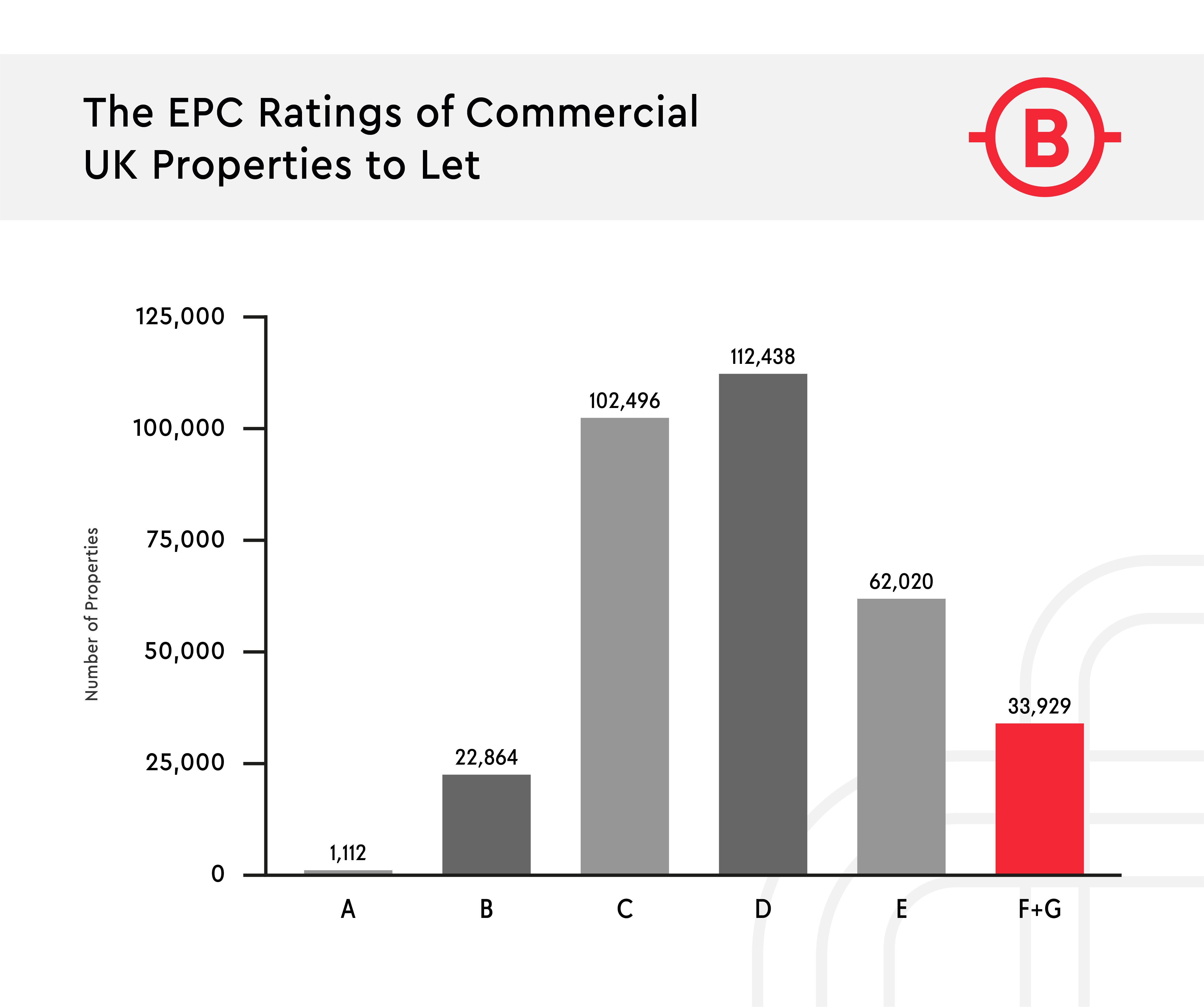
What is MEES?
MEES, or Minimum Energy Efficiency Standards, are minimum requirements for EPC ratings put in place by the government. A large proportion of greenhouse gases come from energy use in large commercial buildings, along with domestic property heating, and MEES is implemented to reduce this.
Since the 1st of April 2018, landlords haven’t been able to let a residential property with an EPC rating lower than band E, due to the introduction of MEES regulations.
These regulations are being extended next year to also affect current leases below a 99 year contract length.
From April 2023, UK landlords will not be able to grant or renew a policy for a tenant if their commercial property has an EPC (Energy Performance Certificate) rating of F or lower. Fines for continuing to let a property from April 2023 will amount to a minimum of £5,000, up to £150,000.
Dale Goodman at Bensons Gas Engineering said: “The new MEES regulations will apply to all of England and Wales, including new leases and where a lease is currently in place.
“If you rent out a property after April 2023, you could incur a large fine and be prohibited from continuing to let the property until relevant improvement works are made.
“To ensure you’re not caught out by the change, you should have an energy efficiency assessor check that your property’s EPC rating is at least an E or above ahead of the deadline.”
Properties that do not require an EPC, will not be liable for this regulation. Nor will holiday lets or those leased for less than the six month period.
How does MEES affect landlords?
By April 2023, it will be deemed against the law to lease properties with an EPC rating of F or below. If you’re a landlord and have a property with a non sufficient EPC rating you could be liable to pay a hefty fine, unless you have a valid exemption in place.
This means that landlords can not rent out a property to a new tenant or renew an existing contract if their property’s energy efficiency rating is not improved. In order to improve the EPC rating, the landlord must have work carried out such as replacing the boiler or insulating the property.
If you’re a landlord and you haven’t done this already, you should review your property’s EPC rating to make sure it is sufficient before the deadline in April 2023.
What does MEES mean for tenants of a commercially let property?
So, how does MEES affect tenants of a commercial building? Although the new rules directly impacts landlords in the commercial property sector, as a tenant you may still be affected by the regulation.
You may be asked to leave the property whilst work is being carried out to improve energy efficiency. However, The Deregulation Act covers tenants against unfair eviction in relation to issues raised around the property’s energy efficiency.
As a tenant, you may be asked to contribute towards the cost of the energy efficiency improvement works. You may also be asked to consent to the landlord accessing the property in order to carry out relevant works which may cause disruption to your business.
How do commercially let properties compare to other property types?
The study found that theatres, music halls and cinemas across the UK were the commercial leased properties that were the least likely to meet the new MEES regulations, with 47.2% having an EPC rating of F or G. Libraries and museums followed with 37% having an EPC rating of F or G. Among the best insulted and energy efficient commercial buildings were hotels with only 2.9% having an insufficient EPC rating and passenger terminals with 3.1% having an EPC rating of F or G.
The highest amount of F and G EPC ratings were also within properties for sale. 13.3% of properties were listed for sale with an EPC rating of F or G. This is likely due to landlords opting to sell properties rather than pay for energy efficiency improvement works.
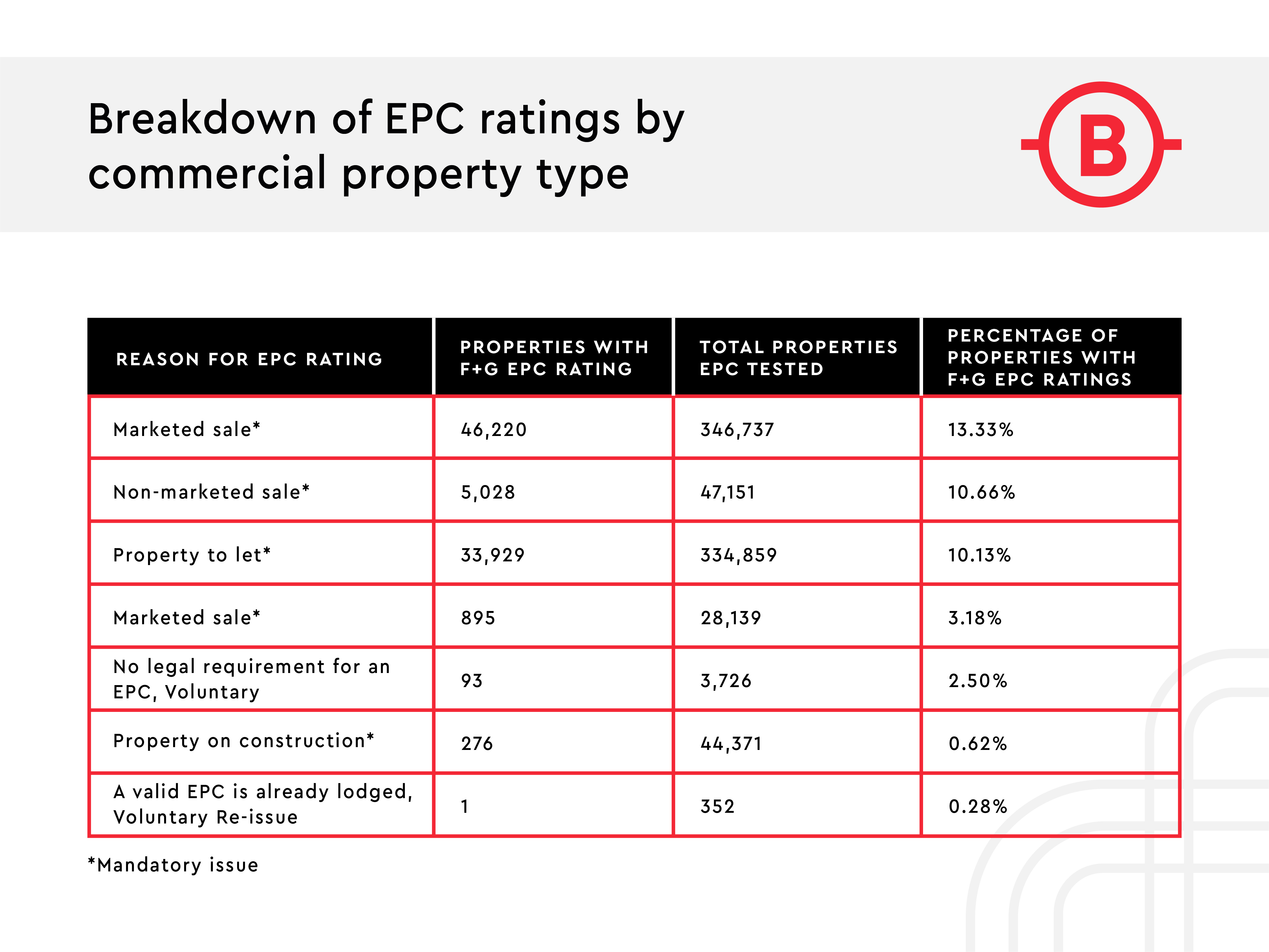
Dale Goodman continued: “As a landlord looking to purchase a property, it is extremely important to investigate the building’s history.
“Research the property to find out why it’s on the market. Otherwise you could find yourself buying a commercial building with a very low EPC rating, leading to higher improvement costs. Unless you can complete this work, or have a valid exemption in place, you won’t be able to rent the property out after April 2023.
“However, exemptions will only last five years meaning the improvement works will have to be carried out in the near future.
“If you’re looking to sell the property it is also important to note that the valuation will be much lower if the relevant improvement works are not made.
“As a tenant looking to lease a commercial property, you should make sure the building has at least an EPC rating of E.
“Leasing a commercial property with an EPC rating lower than this could lead to eviction, disrupting your business and potentially putting you out of pocket if asked to contribute towards energy improvement costs.”
The research also found that 10.13% of commercial properties currently leased out do not have an adequate EPC rating of E or above, so it’s important for tenants to check the history of a building to prevent your business being evicted or disrupted when the new law comes into place in April 2023.
Areas across the UK with the highest and lowest amount of properties meeting MEES
The study found that Richmondshire had the highest number of properties (19.7%) with an EPC rating of F or G. Commercial buildings in this area tended to be less insulated and therefore less energy efficient.
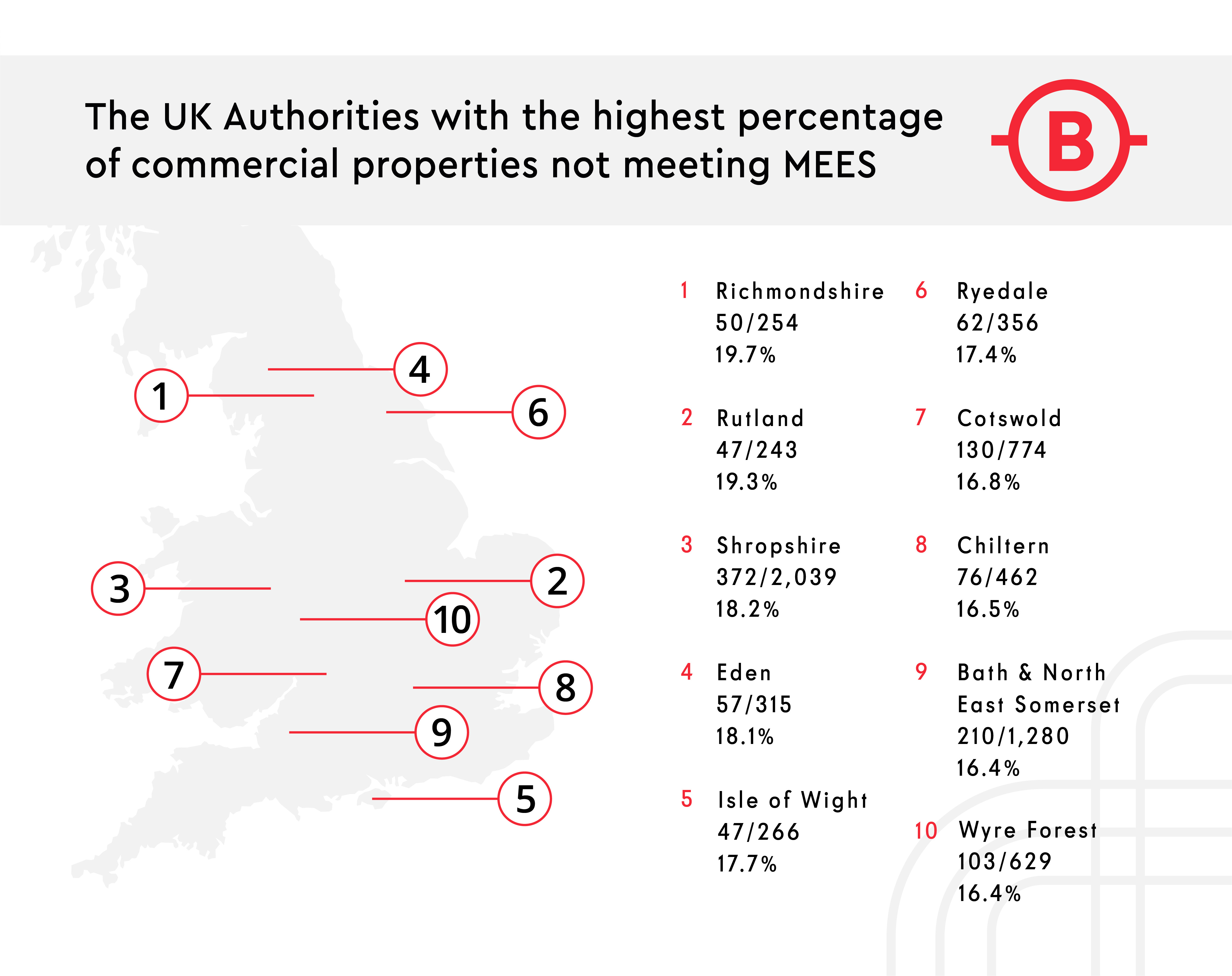
Buckinghamshire had the lowest number of properties with an EPC rating of F or G, at just 1.9%. Commercial properties throughout Buckinghamshire were much more energy efficient and well insulated when compared to those in Richmondshire.
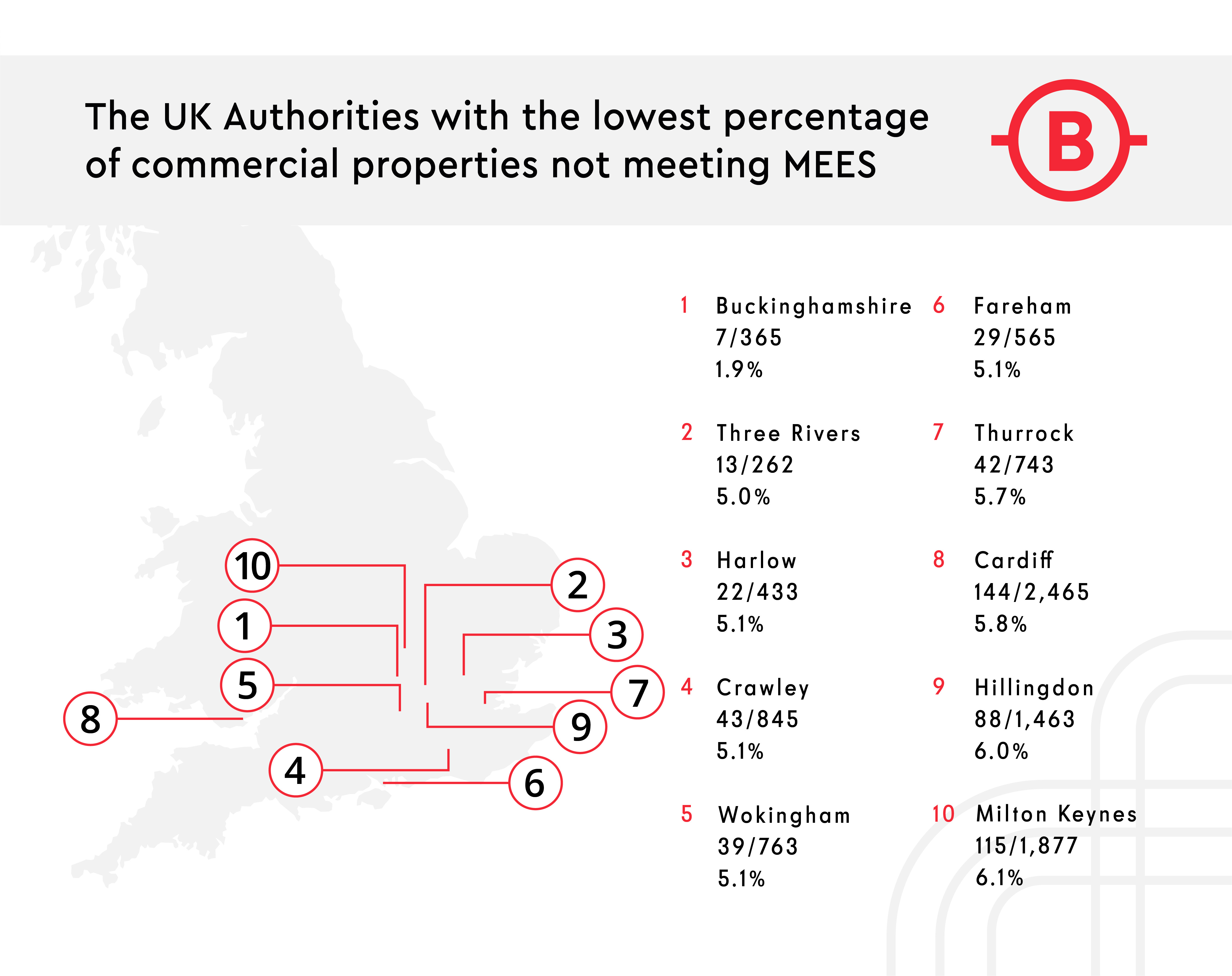
When looking at the sheer quantity of properties in a local authority not meeting MEES regulations, Westminster is top - with 831 properties receiving an F or G EPC rating.
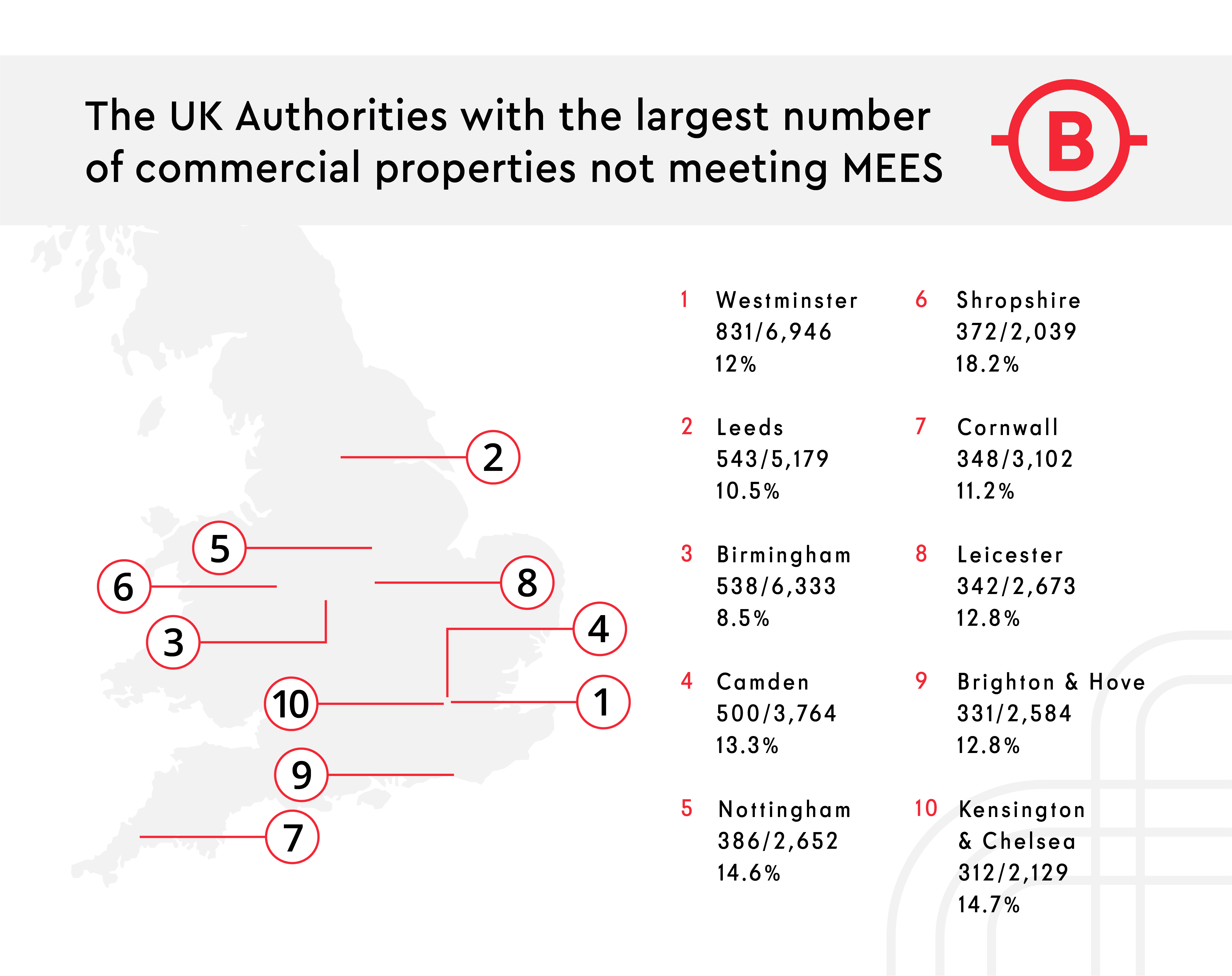
What should you look out for as a landlord when looking to purchase a property?
As a landlord, when looking for a new property to purchase, you should look for a commercial building with at least the minimum energy efficiency level in place. This means that the property should have an EPC rating of at least an E or above. Purchasing a property with a lower EPC rating than E, could lead to difficulties in leasing the property out when the new UK law is enforced in April 2023.
What to watch out for when looking to rent a property
As a tenant looking to lease a commercial property, you should be extremely careful when checking the history of the building. Making sure the commercial property has an EPC rating of E or above is essential to prevent any disruption, eviction or even the potential of having to pay a contribution cost towards energy improvement.
How to improve the EPC rating of a commercial property
Improving the EPC rating of your commercial property will be essential from April 2023, if it is rated F or lower. There are many ways you can improve your commercial building’s energy efficiency, reducing energy bills and your carbon footprint. Here’s just some ways you can improve your EPC:
- Replace the boiler. Opting for a new energy efficient boiler can cut down energy bills and reduce the building’s EPC rating.
- Install double glazing. Upgrading your windows and doors to double glazing can improve your EPC rating and reduce noise.
- Install wall insulation. Insulating your walls can reduce your EPC rating significantly, making sure no energy is lost.
- Install a renewable energy source. Installing solar panels can improve your EPC rating and provide you with cheaper, greener energy.
The energy efficiency assessor providing the EPC rating will suggest the most effective improvements that can be made.
About Bensons Gas Engineering
Bensons Gas Engineering provides commercial gas engineering services to businesses across North England.
To ensure your business is operating safely ready for the new regulation in April 2023, get in touch with a friendly team member to receive a free quote for your commercial gas engineering requirements.
Introducing our new Service Administrator Sarah Cliffe
We recently had the pleasure of welcoming the lovely Sarah Cliffe to the Bensons team as our new Service Administrator!
Read MoreIntroducing Matt Harrison
Matt has recently joined the team at Bensons Gas after working as a National Project Delivery Manager.
Read More
